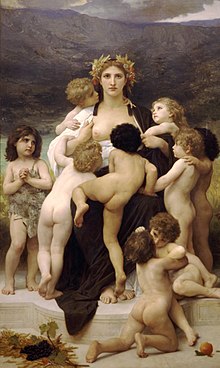Homeland
It has been suggested that fatherland be merged into this article. (Discuss) Proposed since November 2011. |
- "Native land" redirects here. See also: Indigenous land rights.
This article needs additional citations for verification. (June 2010) |

A homeland (rel. country of origin and native land) is the concept of the place (cultural geography) to which an ethnic group holds a long history and a deep cultural association with —the country in which a particular national identity began. As a common noun, it simply connotes the country of one's origin. When used as a proper noun, the word, as well as its cognates in other languages (i.e. Heimatland in German) often have ethnic nationalist connotations. A homeland may also be referred to as a fatherland, a motherland, or a mother country, depending on the culture and language of the nationality in question.
Patria
Patria remains the common term for "homeland, native land" in many languages, based on the Greek πατρίδα (patrída) "native / ancestral land". Hence also the English terms patriot, patriotism.
Motherland
Motherland may refer to a mother country, i.e. the place of one's birth, the place of origin of an ethnic group or immigrant, or a Metropole in contrast to its colonies. People from Australia and former British colonies would sometimes describe the United Kingdom as the "Mother Country", often carrying a strong British Imperialist connotation, and not always in a flattering manner.
Russians commonly refer to Mother Russia as a personification of their nation. Many Russians around the world refer to Russia as their motherland.
The French commonly refer to "la mère Patrie" as France and a ready to die for her.
Hindi, Maithili, Bhojpuri, Nepali, Marathi and Sanskrit have mātrubhūmi (Devanagari: मातृभूमी), literally "Mother-Earth".
Chinese 祖国 (simplified Chinese), 祖國 (traditional Chinese) (pinyin: zǔguó) literally means "ancestral land" and not necessarily "motherland" or "fatherland." However, in English this is almost exclusively translated as "motherland." In Taiwan, the term 母國 (literally "motherland") is also used, though that may be due to Japanese or Western influence.
Among African Americans it is common to refer to the continent of Africa as the Motherland.
Fatherland
Fatherland is the nation of one's "fathers" or "forefathers". It can be viewed as a nationalist concept, insofar as it relates to nations.
The term fatherland (Vaterland) is used throughout German-speaking Europe, as well as in Dutch. For example, "Wien Neêrlands Bloed", national anthem of the Netherlands between 1815 and 1932, makes extensive and conspicuous use of the parallel Dutch word.
Because of the use of Vaterland in German war propaganda, the term "Fatherland" in English has become associated with domestic British and American anti-Nazi propaganda during World War II.
Terms equating "Fatherland" in Germanic languages:
- Danish fædreland
- Dutch vaderland
- Frisian heitelân
- German Vaterland
- Icelandic föðurland
- Norwegian fedreland
- Swedish fäderneslandet (besides the more common fosterlandet)
A corresponding term is sometimes used in Slavic languages, Bulgarian otechestvo and Czech otčina (although the normal Czech term for "homeland" is vlast), Polish ojczyzna (besides macierz "motherland"), Russian otechestvo (отечество) or otchizna (отчизна) (although rodina "motherland" is more common).
Various connotations
- The Soviet Union created homelands for some minorities in the 1920s, including the Volga German ASSR and the Jewish Autonomous Oblast. In the case of the Volga German ASSR, these homelands were later abolished and their inhabitants deported to either Siberia or the Kazakh SSR.
- In the United States, the Department of Homeland Security was created soon after the September 11, 2001, terrorist attacks, as a means to centralize response to various threats. The term is rarely used by common United States citizens to refer to their country, which made the chosen name sound odd to many.[1] In a June 2002 column, Republican consultant and speechwriter Peggy Noonan expressed the hope that the Bush administration would change the name of the department, writing that, "The name Homeland Security grates on a lot of people, understandably. Homeland isn't really an American word, it's not something we used to say or say now".[2]
- In the apartheid era in South Africa, the concept was given a different meaning. The white government had designated approximately 13% of its territory for black tribal settlement. Whites and other non-blacks were restricted from owning land or settling in those areas. After 1948 they were gradually granted an increasing level of "home-rule". From 1976 several of these regions were granted independence. Four of them were declared independent nations by South Africa, but were unrecognized as independent countries by any other nation besides each other and South Africa. The territories set aside for the African inhabitants were also known as bantustans.
- In Australia, the term refers to relatively small Aboriginal settlements (referred to also as 'Outstations') where people with close kinship ties share lands significant to them for cultural reasons. Many such homelands are found across Western Australia, the Northern Territory and Queensland. The 'homeland movement' gained momentum in the 1970s. It is estimated that homeland numbers range around 500 to 700, with not all homelands being permanently occupied owing to seasonal or cultural reasons.[3]
See also
References
- ^ "Reason Magazine - Hit & Run > What Does "Homeland" Mean to You?". Ronald Bailey. July 19, 2007. Retrieved 2007-09-08.
- ^ Noonan, Peggy (June 14, 2002). "OpinionJournal - Peggy Noonan". Retrieved 2007-09-08.
{{cite journal}}: Cite journal requires|journal=(help) - ^ "The Encyclopedia of Aboriginal Australia". 1994.
{{cite journal}}:|access-date=requires|url=(help); Cite journal requires|journal=(help)
